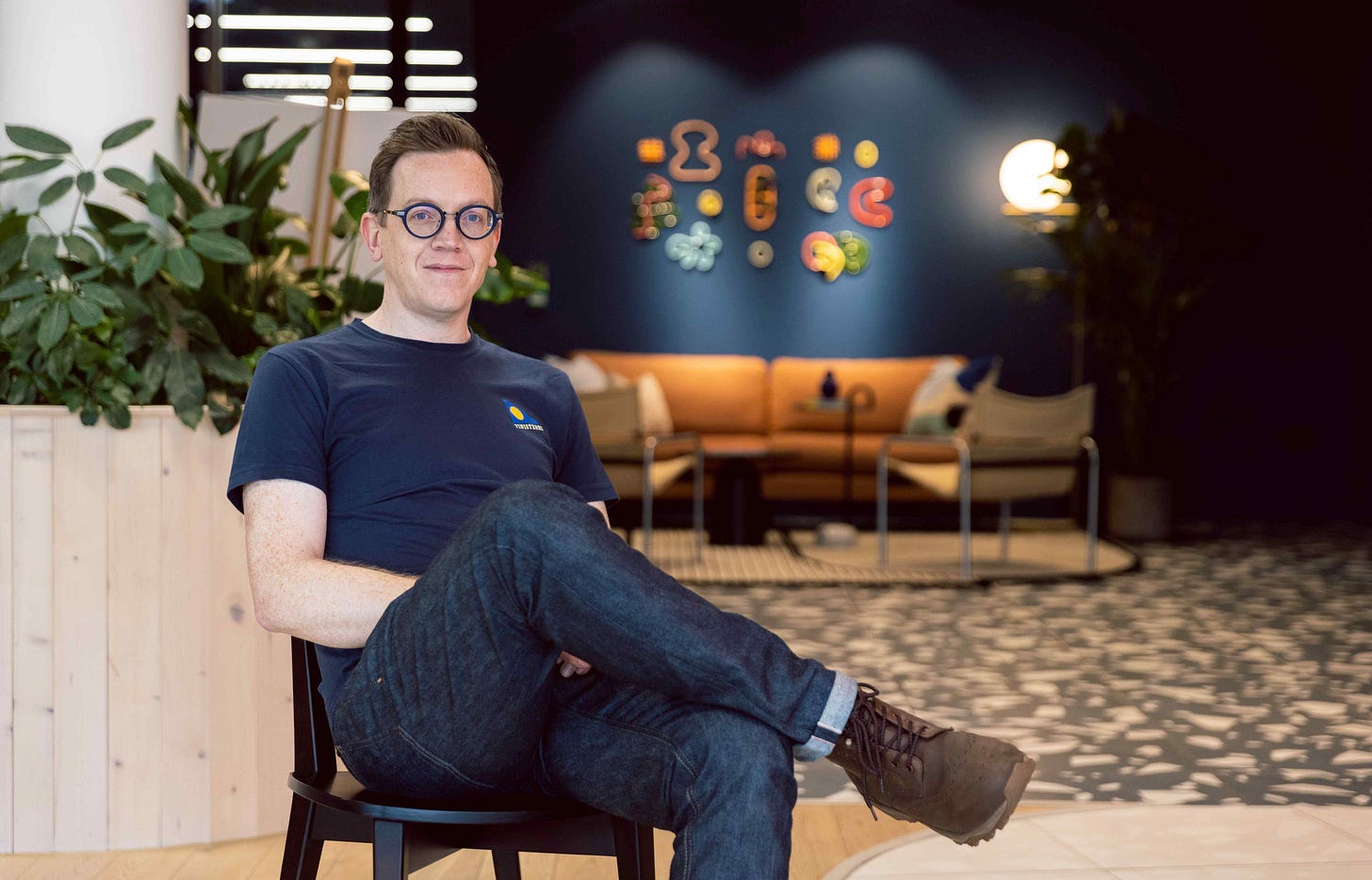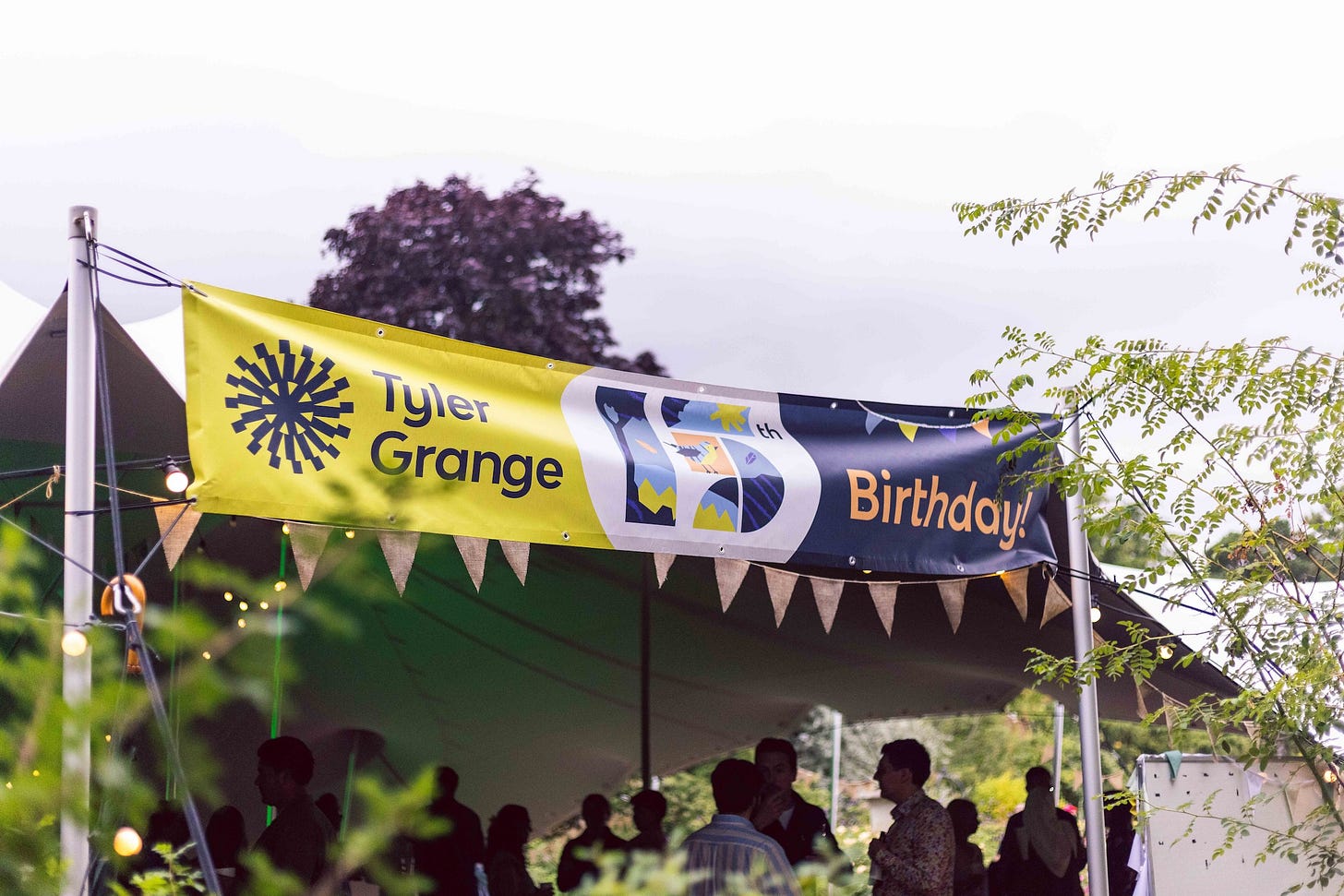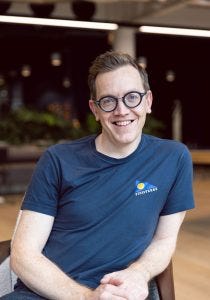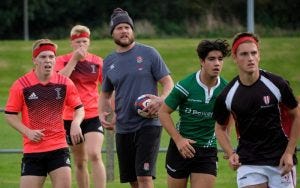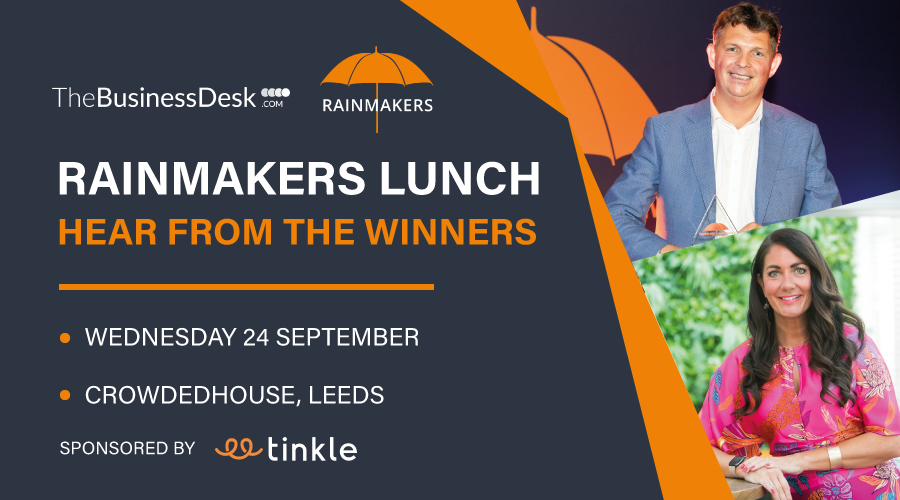"We have no secrecy" inside the big decisions facing Tyler Grange
Buyout, EOT, trade sale, or float? Founder shares his strategic options for the ambitious environmental consultancy business
Hello Rainmakers
When we started Rainmakers we set out with a quest to satisfy our curiosity about what business leaders talk about at that important strategic crossroads.
Jon Berry, founder and managing of Tyler Grange, was in reflective mood when I spoke to him about the journey that led him to create one of the UK’s most progressive environmental consultancies, and he was candid both about the lessons learned from a career that began in a very different world, but also the big grown up decisions the business is facing up to now.
“There does feel an essence of blagging it from day one for us,” Jon Berry laughs, recalling the early days, as he shows me around the Manchester office in Jordan Street, in Knott Mill, close to Deansgate station. But beneath the self-deprecation, and the fun atmosphere around the company, lies a clear vision: to build a really good quality business but that is the antithesis of the rigid, profit-driven corporate culture he once endured.
Looking Ahead: Growth with Purpose
As Tyler Grange looks to the future, Berry is clear that growth will not come at the expense of values.
Today, Tyler Grange has seven offices - in London, Manchester, Bristol, Cirencester, Cardiff, Birmingham and Exeter and Leeds and an employee headcount of over 100. It has made 19 office moves in total, over the 15 years, including spells in a police cell in Stroud and an old pub in Macclesfield.
They are actively looking for new investment, and keeping an open mind as to whether that is private equity, trade sale or an Employee Ownership Trust.
They've been working with the Manchester office of investment bank Cavendish and the law firm Beyond Corporate to help get in front of potential investors, but also to fully understand what any future deal will mean for all stakeholders in the business.
“We have no secrecy,” he says. “Everything that is discussed at board gets discussed with our team, the big driver for us out across all of the options is it's got to align with our values of where we started.
“So we're not chasing the highest valuation. We're chasing who can we work with that we’ve got a responsibility as a B Corp to know where the cash has come from,” he says.
The goal is ambitious: to grow from £10-12 million turnover to £30 million in five years, possibly through acquisitions. But Berry is adamant that the business will remain true to its founding ethos: “Profit isn’t a dirty word. We need to be a profitable business so we can pay everyone well, but you can do that by looking after people and looking after your planet.”
From Corporate Conformity to Creative Autonomy
That ethos and the roots of the business all go back to Berry’s formative years, marked by freedom and creativity, both at school in Birmingham and studying at university in Gloucestershire . “My teachers wanted me to enjoy school,” he says, crediting passionate educators and hands-on experiences for igniting his love of geography and art. This led him to landscape architecture, a field that blended his interests and set him on a path toward environmental consultancy.
But his first major role, at a consultancy later acquired by a large PLC, now part of Waterman (though he doesn’t name them, I look it up) was a wake-up call. “It was the best thing and worst thing I’ve ever seen,” Berry recalls.
He describes how the new corporate owners imposed a top-down, one-size-fits-all culture: “They arrived in our Cotswolds office in minibuses, blacked out. They took our IT kit off us… gave us new kit, and it was pretty much like, this is the way you’re all gonna work now.”
The result was a toxic environment where competition was internal, and well-being was an afterthought. “People weren’t healthy,” Berry says. “It was ultimately internal competition that was just destroying the business.”
The experience left a mark.
“I’d been struggling, overworking, not enjoying it, and then one day in the office, I blacked out… I ended up with six months off work, just fatigue related. But that was the very beginning of thinking, you know what, I can’t do this anymore. I wasn’t enjoying it. I wasn’t turning up and being myself.”
Founding Tyler Grange: A rebellion with a cause
In 2010, against the backdrop of a recession, Berry and three colleagues decided to strike out on their own. They wanted to create an environmental consultancy that built on their expertise in arboriculture, ecology and landscape planning.
“It feels like a bad time to leave in a recession, but also it feels like if we don’t leave now, we’re all going to be unwell,” he remembers. Their vision was simple but radical: “Let’s start something where we can focus it on being well, enjoying it, and actually doing work that’s meaningful to our clients.”
The name Tyler Grange was, fittingly, a creative invention—two words put together over lunch, with no initial meaning but a desire to create something that would come to stand for their values. From the outset, the business was built on autonomy, trust, and a commitment to people.
“It immediately gave me this purpose: be myself again. I can do what I want to do. I got that autonomy, but also the hard work. We knew the hard work could make a difference.”
Strategy: people as competitive advantage
Tyler Grange’s strategy is to do great work for the UK’s leading architects, housebuilders and developers to ensure that projects are delivered with optimal benefits to people. The environment.is rooted in the belief that people are the ultimate competitive advantage.
“In a world where innovation is pushing us towards AI… for us, that means we’ve got to pivot and become even more human,” Berry explains. The consultancy has embraced technology—using drones and AI for habitat surveys—but insists that the real value lies in relationships and collaboration. “I’m a massive fan of not having competitors. I see them as collaborators.”
Last year, Tyler Grange appointed Berry as Managing Director. Previously Director of People, Places and Purpose at the firm, under his leadership the disruptive business continues to operate as efficiently, effectively, and productively as possible - whilst acting responsibly and creating a healthier future for people and the planet.
The business’s five-year strategy is explicit: “For us to be the best, we’ve got to be the most human we can be over the next 10 years. Let AI and technology do the stuff that we need it to do, but actually we’ve got to maximise human contact.”
Culture: inclusion, transparency, and wellbeing
Perhaps the most striking difference between Tyler Grange and Berry’s previous employers is the culture. The company is well known for its early adoption of a four-day working week, a policy that has attracted global attention, not least from Esther McVey, his local MP, who asked him to stop setting a bad example.
He says he rang her office to set up a meeting to explain why they had done it, but they were only open three days a week, so he dropped it, he laughs.
“We’d seen some stuff in Scandinavia on four day week, and were interested… so we were like, let’s just do it and be the best thing we ever did.” The results speak for themselves: “We’re still hovering around 30% more productive, still 60 odd percent less absence through sick leave. We’re still more profitable. It’s not affected any metric.”
He says wellbeing is not just a buzzword. Employees have access to an app that tracks happiness and fatigue, with real-time interventions if someone is too tired to drive. “We have loads of wellbeing support in the business. People say you spend too much of your budget looking after people, and it’s like, well, why would I want people… we only have a two or 3% flight risk people going, which is, like, it wouldn’t be that if we didn’t look after people.”
Transparency is another cornerstone. “Every everything that’s discussed at board gets discussed with our team, because otherwise, somebody finds out, and then it becomes an issue.” Ownership and investment decisions are shared openly, and the company has explored employee ownership, management buyouts, and impact investment, always with the caveat that any partner must align with their values.
A serious business
Berry says he has worked out that the consultancy has helped to deliver over 3,000 hectares of new green infrastructure and public open spaces in the UK – that’s the equivalent to around 20 Hyde Parks – as well as enjoying 135 non-working Fridays and donating over 8,000 volunteering hours to its local communities and charity organisations. It’s also brewed and gifted some 6,500 cans of its low carbon beer, which is enough to fill a small swimming pool.
The consultancy is also at the forefront of the mandatory new Biodiversity Net Gain (BNG) regime and leads on major development projects and knowledge sharing, though it is gently lobbying on some well-meaning but potentially hazardous changes to planning laws over classifications of habitats.
"That that isn't where the delay is in planning. The delay is there's no money in public services and no skills left because every planning department has been obliterated. Our clients are saying they don't want broad classifications of habitats," he explains.
A Platform for Growth and Kindness
Berry’s commitment to inclusion extends beyond the business. He speaks passionately about the “dream catcher” program, developed with former England rugby player, Rusty Earnshaw which helps employees articulate their life goals—whether or not they involve Tyler Grange.
“We get that real truth out of people. So Tyler Grange can be that stepping stone… we helped [one employee] work out how he could leave us, but work for us as a sub, and have enough money so he could spend two days a week surfing. He did it, and he’s the happiest man you’ll meet.”
Berry himself uses his “fourth day” for a side project, the Kindness Forecast, tracking and encouraging random acts of kindness. “It’s not always about money. It’s about just giving your time or opinion on something.”
At some point, this process of strategic planning for the future will come to an end.
One day a major corporate might like a slice of Tyler Grange, or a private equity investor with a penchant for backing a buy-and-build of similar businesses. There’s no doubt they will buy a business driven by passionate people.
But they absolutely mustn’t rock up in a fleet of people carriers with blacked out windows.
::
We are hosting Rainmakers Lunches soon, an opportunity to network with leaders from the corporate finance sector.
These events will bring together the region’s Rainmaker community to discuss the deals market in 2025 and celebrate your successes over the last 12 months.
We will be joined by our Rainmaker of the Year in each city.
Joining us in Leeds on the 23rd of September will be Rainmaker of the Year – Paul Mann, partner in the corporate team and head of the private equity team in the UK at Squire Patton Boggs.
Also attending is the Changemaker of Year, Alexandra Fogel, partner and head of private north at EY, who scooped the award at our Rainmakers awards in June.
Chris Handy, who is Partner and Head of West Midlands for LDC, alongside him we will have Richard Swann from Inflexion, who won our Changemaker of the Year award. on the 2nd of October.
Also on the 2nd of October in Manchester we have Rainmaker of the Year – Michael Loudon, partner and head of the North West at Clearwater.
Alongside him will be our Changemaker of Year, Greg Holmes, from Palatine, who scooped the award at our Rainmakers awards in June.
Also providing insights will be Claire Alvarez of private equity firm Foresight, who won the finance leader category at the Leadership Awards 2024 and shortlisted for Rainmaker of the year.
Laura Wiggins, our Rising Star, will be on maternity leave and we send her our very best wishes.
::
Thank you for subscribing to Rainmakers.
We believe in good journalism that is worthy of your support. Please share this edition of Rainmakers so we can grow the message further and wider.
The insights and commentary we share with you are rooted in the trust we have built in the business community.
We’re also on LinkedIn - please join our Rainmakers community group for updates and offers and opportunities to comment.
If you have something you think we should look at, then either reply to this newsletter or email michael.taylor@thebusinessdesk.com.
Rainmakers is a reader-supported publication. To receive new posts and support our work, consider becoming a paid subscriber.



